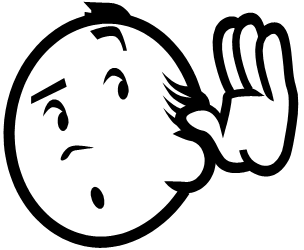I am very much aware that the “thinking equation” is still somewhat simple. We need information as input in order to output a result (expressed learning). One can argue an extreme existential idea that a person who has a brain but absolutely no ability to sense anything might (a stretch for sure) still be able to think but I believe this is almost arguing for the sake of arguing.
So much of our input is aural and so I want to make a specific case of the difference between hearing and listening. It is a profound differential in awareness and it, like so many other heightened awarenesses, requires discipline and dedication. I do believe that we require longer processing time for learning because the vast (vast!) majority of our aural informational input is acquired through hearing. This is a very rough filter for information gathering. And it holds the potential for great inefficiencies.
But, like any muscle, there are ways to develop and strengthen and heighten our abilities to go deeper into the listening experience…and the reap the rewards of discoveries many layers below what we have become accustomed to accept as ‘normal’.
I want to share this brilliant TEDTalk with Pauline Oliveros the author of the idea of Deep Listening:
Pauline Oliveros (May 30, 1932 – November 24, 2016[1]) was an American composer, accordionist and a central figure in the development of experimental and post-war electronic art music.
It is a great and short entry into a deep and rich world of hearing beyond hearing.

Leave a comment